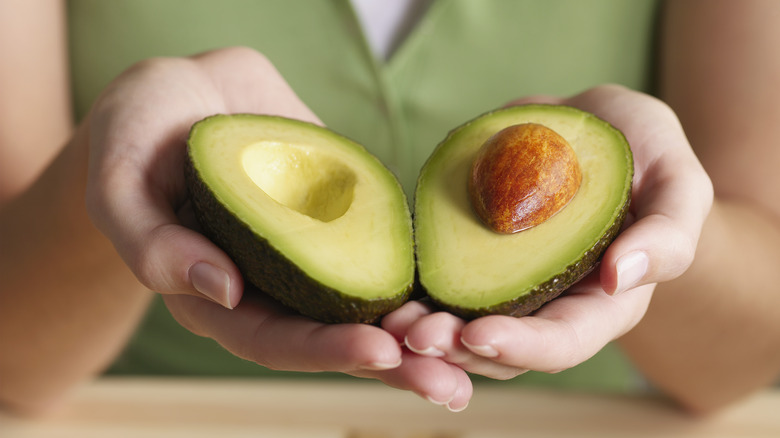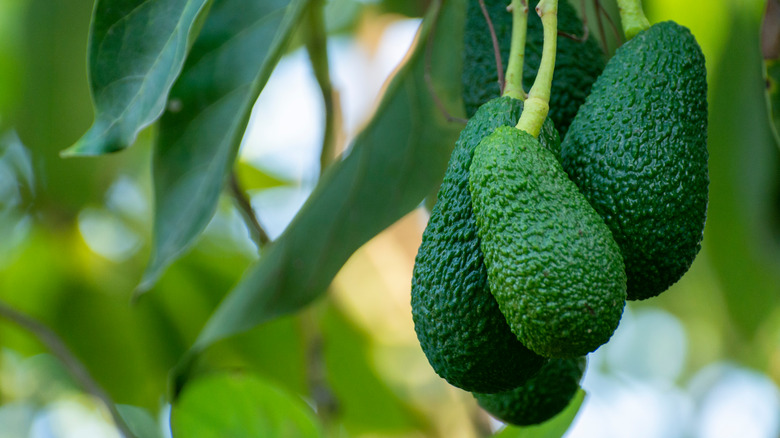The World's Most Popular Avocado Variety Is Named After A Mailman
We may receive a commission on purchases made from links.
If you head to your local supermarket for an avocado, chances are you will be buying a Hass variety. Hass avocados comprise 95% of all avocados grown in California, per California Avocados, and Mexico has over 30,000 Hass avocado groves just in the state of Michoacán alone. We all love to poke fun at how quickly avocados go from unripe to spoiled. Still, the avocado has seen its consumption numbers triple over the past 20 years, according to a 2022 report released by Hass Avocados (via Business Wire) — and despite its fussy tendencies, it doesn't look like anyone will give up this beloved fruit anytime soon.
Indigenous farmers in Latin America were cultivating avocados long before Spanish colonizers happened upon them in the 1500s, according to a deep dive published by KCET. Even so, it wasn't until the Hass avocado hit the market that the United States caught on to the benefits of this green-colored produce — prior to that, the tough skin and silky texture of the Hass avocado led to previously unseen profitability for growers. So who would have thought a part-time botanist/mail carrier would impact agriculture and the culinary world in such a profound way by bringing avocados to the fore?
An unlikely botanist paved the way for the avocado market
According to the book "The Food Explorer: The True Adventures of the Globe-Trotting Botanist Who Transformed What America Eats" by Daniel Stone, a California mail carrier in 1926 who had invested his life savings in indulging his passion for growing avocados accidentally came upon one variety. This postal worker, whose name was Rudolph Hass, noticed that this varietal matured faster and tasted better than the others he had observed. Hass knew he was onto something, so much so that he secured a patent for that particular fruit in 1935.
Unable to find a more appropriate name for this new type of avocado, Hass ultimately named it after himself. And although he attached his name to the cultivar he discovered — possibly sufficient recognition for his discovery all on its own — the man who revolutionized avocado farming only made $4,800 for his hard work, according to Smithsonian magazine.
To put it in perspective, however, avocados were sold in the United States prior to Hass' findings. In the early 1900s, the Fuerte variety of avocados was sold in markets, although they went bad quickly and had fragile skin — two factors that made them difficult to ship. With their tough rind and long shelf life, Hass avocados could withstand rough handling during shipping and arrive at their destination unspoiled.
Raise an avocado to Rudolph Hass with these tips
When growers discovered that the Hass trees matured faster and produced far more fruit than other varieties, they saw dollar signs sealing the deal for the success of the Hass avocado. But, despite the popularity of the Hass variety, many different varieties can still be found in produce markets.
Picking the best avocado out of the bunch is far from daunting, according to a video posted by Healthline. When choosing an avocado, look for one that yields under slight pressure. Remove the piece of the stem where the fruit grew on the tree, and you'll get a sneak peek at what's inside. Is the color pale green? That avocado needs some more time to ripen. Is it light brown? Put it back; that one is past its prime. You'll know you have the perfect avocado when you see a vibrant green behind that stem.
After you find that perfect avocado, keeping it fresh is easier than you think. Even more good news: You may not realize that ripe avocados can be refrigerated. Refrigerating avocados gives you more time to gather ingredients for a festive recipe for your next gathering, during which you can raise an avocado toast to Rudolph Hass, the mail carrier who started it all.


